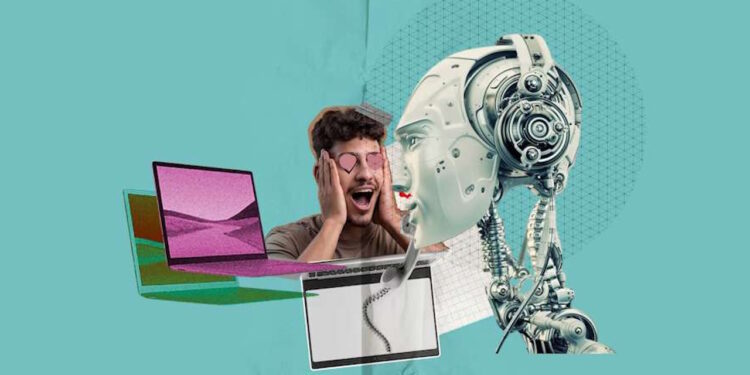A growing unease among Generation Z is the ever-increasing influence of artificial intelligence (AI) on their professional future. Recent statistics from ZipRecruiter indicate a sizeable 76% of this generation expresses anxiety that AI systems, including ChatGPT, might encroach upon their employment opportunities.
This fear is particularly resonant when considering entry-level roles, frequently the inaugural steps into the professional realm for Gen Z. AI is steadily encroaching on these “initiate” positions. As 83% of corporations are striving to establish a human-centric work environment, their Learning and Development departments are actively stepping up to support employees. Despite Gen Z’s digital literacy and their proficiency with machine learning applications like ChatGPT, the migration of AI into lower-level tasks brings their career stability into question.
In times past, rudimentary tasks were the traditional springboard for careers. Lately, however, corporations have displayed hesitation in funneling resources into comprehensive training programs, instead depending on novice staff members to learn via practical experience or self-initiated study. MIT researcher, Paul Osterman, asserts that those who need training the most, including Gen Z, are often overlooked. A mere 38% of contractual employees acknowledge receiving formal training from their official employers, with even fewer receiving location-specific instruction. Freelancers also have limited access to formal training at client locations, trailing regular and contractual employees by nearly 36% in receiving informal training. Concurrently, sourcing skilled workers has evolved into a formidable challenge for HR executives, with 80% acknowledging this issue, according to the Conference Board. Companies are therefore probing a variety of solutions, including reducing training programs, cost containment, and leveraging AI for unwavering operational support. If company leaders opt not to invest in training new recruits, AI might potentially substitute for these roles.
The article “10 Tips On How To Avoid Burnout” might also be of interest to you. We recommend giving it a read.
Shifting Away from Conventional College Degrees: A Potential Pathway for Gen Z
The escalating costs of higher education and the politically charged issue of student loan forgiveness has not only Gen Z, but also a broader demographic questioning the value of a traditional college degree. State leaders, irrespective of their political affiliations, have introduced initiatives that reduce the need for four-year college degrees for most public sector jobs. As reported by Vox, Spencer Cox, the Republican Governor of Utah, joins Democrat Josh Shapiro from Pennsylvania, along with leaders from states like Maryland and Alaska, in diminishing the necessity of conventional college degrees for public roles.
About a decade ago, IBM opened less than 10% of its roles in the U.S. to applicants without degrees, regardless of their skill sets. To expand its recruitment pipeline, IBM initiated the SkillsFirst initiative, as cited in the Harvard Business Review. The company reengineered its hiring methods to include competent non-degree workers who had been previously overlooked, aiming to create a diverse talent pool. A study named “Dismissed by Degrees” revealed that more than 60% of employers declined otherwise suitable applicants simply because they lacked a degree. While this trend is shifting gradually, it prompts us to wonder if the change will be substantial enough.
Gen Z’s Struggle Against AI and a Deficit of Direct Communication
AI is not the only hurdle that Gen Z faces. In the article, “Remote Work is Failing Young Employees,” authors Charlie Warzel and Anne Helen Petersen explore the case of Haziq, a 22-year-old resident of Ireland. Haziq expresses concern about the absence of soft skills one usually acquires in the early career phase. He shares that being physically near his manager would facilitate quick interactions, but he is hesitant to reach out via platforms like Slack, unsure of their current engagement. As a result, learning opportunities at work have significantly dwindled. Even though hybrid work models or a return to the office might provide some resolution to this lack of immediate communication, the rise of AI and its ever-increasing responsibilities poses the question of whether physical proximity still holds value. If AI is now managing these opportunities, the relevance of physical presence diminishes. Thus, Gen Z’s professional prospects may become less dependent on physical presence, especially when AI seems to be assuming these roles.
The Hunt for Meaning: Gen Z’s Long Road to Substantial Opportunities
In the ZipRecruiter survey, 41% of job seekers identified the struggle to discover relevant opportunities as their main obstacle. The increasingly drawn-out interview process presents another challenge. The Wall Street Journal article, “Nine Rounds of Interviews and No Callback,” features Rza Mollayev sharing his job search experience since 2020. After graduating from NYU, he received a job offer within a month and a half. However, when he re-entered the job market, he encountered intense competition, with job postings on LinkedIn attracting up to 1,000 applicants. After applying to 120 jobs, participating in 30 interviews with 19 companies, and enduring up to five interview rounds, he finally secured a position with cosmetics powerhouse Lancome.
The article “8 Tips To Help You Climb The Career Ladder” might also be of interest to you. We recommend giving it a read.
When a Gallup survey indicates that only 24% of U.S. employees strongly believe their organizations care about their welfare, the impending threat of AI takeover exacerbates the wound. Gen Z workers often grapple with a sense of aimlessness at work, especially when their roles feel trivial rather than significant. As generative AI steps into the workplace, these feelings may amplify. Insider anticipates that the most tech-literate workers will transform into “machine supervisors,” constantly rectifying errors generated by impersonal AI tools. Gen Z finds themselves at a crucial crossroad, as do we all. The hybrid work model now encompasses more than a blend of remote and in-office work—it implies harmony between human employees and disruptive AI technology. The fight for significant job opportunities for Gen Z—and for all of us—in the AI era is just beginning.


